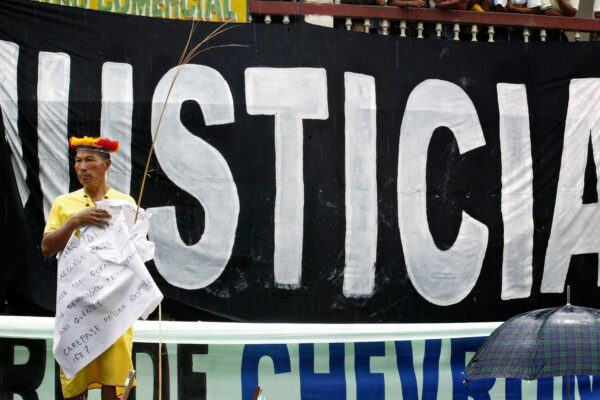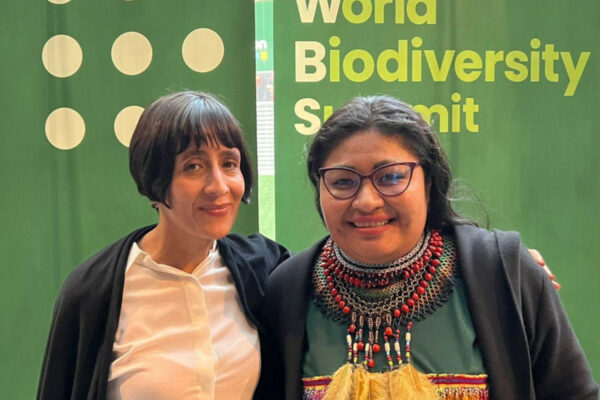The emerging spread of COVID-19 could have a devastating effect on Indigenous peoples, particularly those living in voluntary isolation, due to their vulnerable immune systems, lack of access to healthcare facilities, and lack of potable water and sanitation infrastructure in villages.
Amazon Watch reaffirms its commitment to Indigenous peoples across the Amazon and amplifies their call to defend the rainforest by instituting a moratorium on any activities that involve the entry of outsiders into Indigenous territories, such as mining, logging, oil extraction and exploration, industrial agriculture, and evangelical missions.
Without guidance or support from public health agencies, many Indigenous groups are taking preventative measures on their own to stop the coronavirus from entering their communities: voluntary social distancing; use of proper hygiene practices; suspension of major protests, events, and travel; and even the closing of traffic between villages to prevent the disease’s transmission.
Indigenous peoples across the region explicitly demand that any and all outsiders refrain from traveling to Indigenous territories until further notice due to the acute threats posed by the COVID-19 pandemic.
Amazon Watch Executive Director Leila Salazar-López made the following statement:
“As humanity faces a global pandemic, Indigenous peoples of the Amazon are among the planet’s most vulnerable to the COVID-19 virus. This is not only because they are more likely to face poor nutrition, lack of health care, and water contamination, but because of the historical reality that government authorities have denied them adequate health services while allowing destructive industries and organized crime to overrun their lands. Indigenous people in this moment are also facing generational trauma related to colonization, when outsiders brought illness into their territories. This continued government negligence in the face of COVID-19 could result in the ethnocide of the very peoples safeguarding rainforests, who provide expansive knowledge to the other existential crisis we face: the global climate emergency.”
In response to our partners on the ground, we call on government authorities to:
- Enforce demands to deny entry to any outsiders into their territories
- Provide adequate health and public services to address this crisis
- Ensure rigorous governance and law enforcement on organized crime in Indigenous territories
- Cease any and all mining, logging, oil extraction and exploration, industrial agriculture, and evangelical missions on or bordering Indigenous territories
“We call on allies around the world to amplify the messages from Indigenous peoples across the Amazon basin who are, once again, fighting for survival. We must mobilize to prevent the spread of the novel coronavirus in all Indigenous territories and communities.”
Background by Country
Brazil:
The country is facing thousands of confirmed COVID-19 cases and the situation is changing rapidly. President Bolsonaro is imperiling his constituents by mimicking President Trump, calling the spread of the virus “all hysteria” and a “media trick” while moving to bail out major economic actors to the detriment of public welfare. In a major political shift, Brazil has seen an upswell of protests against Bolsonaro for his failure to take preventative measures. Many of the protests were in wealthy neighborhoods which were previously Bolsonaro strongholds, especially in São Paulo and Rio de Janeiro.
Currently, there are only a few suspected cases of Indigenous people becoming exposed to the novel coronavirus, but none have been confirmed. All had contacts with foreigners in the last few weeks and all are currently isolated.
Indianara Ramires Machado Kuña Rendy’i, a Guarani Kaiowá nurse living on the Dourados Reserve and a member of the Young Indigenous Action (AJI) group, in Mato Grosso do Sul state, told Mongabay that lack of access to potable water, poor health conditions, and malnourished children make the territory particularly susceptible to a COVID-19 outbreak.
Nara Baré, Executive Coordinator of the Coordination of the Indigenous Organizations of the Brazilian Amazon (COIAB), said:
“We demand that the Brazilian government take preventative measures to contain the advancement of COVID-19 within and around Indigenous territories. We demand the immediate expulsion of invaders such as wildcat miners, loggers, hunters, land grabbers, and missionaries, who endanger the existence, lives, and health of more than 300,000 Indigenous people from 180 contacted peoples, and that of 114 peoples in voluntary isolation living in the Brazilian Amazon.”
Peru:
The country is facing its highest concentration of known COVID-19 cases in the capital city of Lima. One Indigenous person has reportedly been infected, a Quechua leader from Pastaza, who recently returned from an advocacy trip to Europe and is quarantined in the city of Tarapoto. No cases have been reported from the Wampis and Ajuajun peoples, but they’re concerned that the virus could come into their territories due to frequent travel between Peru and Ecuador. The Achuar people are isolated and have reported zero cases. The Ucayali region is a tourist area so it faces a higher likelihood of exposure.
The Inter-Ethnic Association for the Development of the Peruvian Amazon (AIDESEP), Peru’s largest Amazonian Indigenous organization, issued a statement on March 17th, which, among other demands, encouraged Indigenous communities to:
“…ratify the national quarantine, closing down the entry of outsiders under the national infection drops. Also, the departure of community members is dangerous, excepting emergency situations. Those who leave could bring infections with them upon their return. Enforcement actions should be peaceful but firm, informing local authorities.”
AIDESEP is also demanding that, “companies adhere to the quarantine and prohibit movement of their personnel and transit through communities.” According to an article in Gestión, the oil company PlusPetrol will continue operating in Block 8 (Loreto) and the Camisea project in southern Peru during the state of emergency. This is the same company the above-mentioned Quechua leader was denouncing in the Netherlands for tax evasion and environmental destruction.
Ecuador:
The coastal Province of Guayaquil is considered a hotspot and is currently reporting the highest level of cases: 807 infected compared to just 65 in the capital city of Quito. Many Indigenous organizations have designed teaching materials in their own languages to provide information and care measures about the novel Coronavirus. This information is also being broadcast on local radio stations in the province of Pastaza, where the largest territories of Indigenous peoples are found. At the moment, there are no cases of coronavirus in this region.
A regional organization representing 1,500 Indigenous peoples, CONFENIAE, reported that its 11 nationalities have decided to “close” their territories to prevent people from entering and leaving. The communities have organized to control access to their territories because they feel that the authorities have not been able to enforce the closure of their territories from outsiders.
Despite the joint statement by CONFENIAE and government measures to restrict travel due to the novel Coronavirus, Illegal loggers have been reported in Waorani territory. The hydroelectric company GENEFRAN called for clandestine meetings in the Kichwa territory of Santa Clara. The government announced that the oil companies operating in the country will increase crude production to offset the drop in oil revenues.
In Ecuador, Indigenous peoples are not only facing the onset of COVID-19, but also devastating flooding of the Bobonaza River impacting Kichwa Indigenous communities including Sarayaku which is unlike any natural disaster they have faced before. COVID-19 is also further exacerbating the crisis because the government has limited capacity to provide emergency assistance during the flooding.
Amazon Watch has been working closely with Sarayaku leaders and the community’s youth that are in Puyo. Those leaders have launched a crowdfunding campaign to help the hundreds of families who lost everything and to rebuild their homes and community. In response to a coordinated Twitter storm last week, government officials were publicly forced to respond but provided no clear indication of what, when, or how the aid will be delivered.













